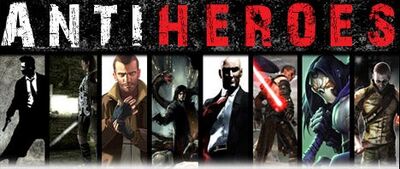The official discord link if you wish to join the discord: https://discord.gg/j5RKwCvAFu
Support the wiki on our official Ko-Fi page or Patreon page!
Category:Anti-Heroes: Difference between revisions
GiverOfThePeace (talk | contribs) (Created page with "For characters who are Anti-Heroes. An Anti-Hero is a protagonist who has the opposite of most of the traditional attributes of a hero. They may be bewildered, ineffectual, de...") |
|||
| (One intermediate revision by the same user not shown) | |||
| Line 1: | Line 1: | ||
[[File:Anti-Heroes.jpg|center|400px]] | |||
An '''antihero''' (sometimes spelled as anti-hero) or antiheroine is a main character in a story who may lack conventional heroic qualities and attributes, such as idealism, courage, and morality. Although antiheroes may sometimes perform actions that most of the audience considers morally correct, their reasons for doing so may not align with the audience's morality. An antihero typically exhibits one of the "Dark Triad" personality traits, which include narcissism, psychopathy, and Machiavellianism. | |||
There is a controversy over what exactly defines an antihero. The Merriam-Webster dictionary defines an antihero as "someone who lacks heroic qualities", yet scholars typically have differing ideas on what constitutes as an antihero. Some scholars refer to the "Racinian" antihero, who is defined by several factors. The first being that they are doomed to fail before their adventure begins. The second constitutes the blame of that failure on everyone but themselves. Thirdly, they offer a critique of social morals and reality. To other scholars, an antihero is inherently a hero from a specific point of view, and a villain from another. This idea is further backed by the addition of character alignments, which are commonly displayed by role-playing games. | |||
Typically, an antihero is the focal point of conflict in a story, whether that be as the protagonist, or as the antagonistic force. This is due to the antihero being particularly engaged in the conflict, typically on their own will, rather than a specific call for the greater good. As such, the antihero focuses on their objective first, and everything else is secondary. | |||
[[Category:Characters]] | |||
Latest revision as of 09:22, 1 February 2023

An antihero (sometimes spelled as anti-hero) or antiheroine is a main character in a story who may lack conventional heroic qualities and attributes, such as idealism, courage, and morality. Although antiheroes may sometimes perform actions that most of the audience considers morally correct, their reasons for doing so may not align with the audience's morality. An antihero typically exhibits one of the "Dark Triad" personality traits, which include narcissism, psychopathy, and Machiavellianism.
There is a controversy over what exactly defines an antihero. The Merriam-Webster dictionary defines an antihero as "someone who lacks heroic qualities", yet scholars typically have differing ideas on what constitutes as an antihero. Some scholars refer to the "Racinian" antihero, who is defined by several factors. The first being that they are doomed to fail before their adventure begins. The second constitutes the blame of that failure on everyone but themselves. Thirdly, they offer a critique of social morals and reality. To other scholars, an antihero is inherently a hero from a specific point of view, and a villain from another. This idea is further backed by the addition of character alignments, which are commonly displayed by role-playing games.
Typically, an antihero is the focal point of conflict in a story, whether that be as the protagonist, or as the antagonistic force. This is due to the antihero being particularly engaged in the conflict, typically on their own will, rather than a specific call for the greater good. As such, the antihero focuses on their objective first, and everything else is secondary.
Pages in category "Anti-Heroes"
The following 36 pages are in this category, out of 36 total.
